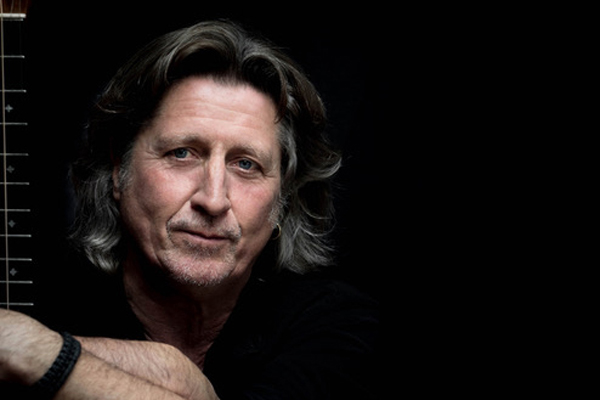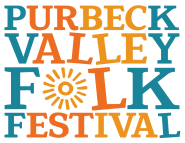Steve Knightley
Sunday
Steve Knightley of Show of Hands will feature in PVFF’s Songwriters Circle this year.
Multi-award winning singer-songwriter/musician and founder member of widely acclaimed folk/acoustic roots trail-blazers Show of Hands, Steve Knightley (b.1954), had an epiphany about his life’s work one evening in 1999 whilst out on a date.
Knightley was explaining to his future wife, Clare – a forthright west country Doctor – that his almost continuous touring schedule, whether solo, with Show of Hands or in collaboration with other musicians, sprang from what he deeply felt to be a flaw. “I thought my need to be applauded was a weakness or a frailty. But Clare said, ‘Oh I thought it was your job. What’s the big deal?’”
Knightley was five when his parents, both from Southampton families of dockers and soldiers, moved with their kids to Exeter, and 13 when they re-located to Exmouth. Although there was an old guitar and an accordion lying around the house, neither his parents nor his siblings – two sisters, a brother and stepbrother – were particularly musical.
His stepbrother, a soldier, was into folk music and Knightley, having picked up the guitar, learnt to play strumming along to his record collection. Hearing Martin Carthy at Sidmouth, Knightley was still in his early teens when he made the connection between English folk and the music he was listening to at home. Joan Baez, Paul Simon and Bob Dylan, he realised, all played English songs collected by the Victorian folklorist Francis Child. And some of these could be found in his dog-eared copy of the Penguin Book of English Folk Songs.
Passing his 11+ and attending the local grammar school, Knightley mostly focused his energies on sport (especially rugby) and practising guitar. Although shy and lacking in confidence with girls as a young teenager, by the time he was 15, Knightley had discovered an appreciative audience amongst the Scandinavian language students who filled Exmouth every summer. He says: “I was asked to play dismal songs at beach parties and barbecues to Swedish girls. Bert Jansch’s song about a heroin addict was a favourite. They would say. ‘We love Needle of Death, it’s so sad!’”
But the desolate out-of-season feeling of the town after the students and tourists had left impacted on Knightley as much as the demand for his guitar playing during those summer parties. He would spend hours down at the shore, gazing out to sea. Life, it felt then, happened elsewhere.
This feeling fuelled his keen poetic imagination. Unnoticed by most of his teachers, it was recognised by the poet Ted Hughes. Still just 15, Knightley attended a residential creative writing course organised by the Arvon Foundation in Beaford, North Devon. Finding his plan for a week-long piss-up with his mates derailed by the inspiration he drew from the work, Knightley was moved to write songs and poetry. At the week’s end, Hughes arrived. In the Victorian drawing room of the old vicarage, by the hearth of an open fire, the great poet read out his work to the students. They then read out their poems to him and Knightley “strummed a few songs and read some stuff.”
Hughes asked, “What’s your name, son?” “Steve Knightley.” “No, no, what’s your full name?” “Steven Andrew Knightley.” “The Celts,” said Hughes, “would say if you gave a man your full name, he had your soul.” He stretched out his hand and closed it as if catching a fly. “Now then, I’ve got yours.”
Knightley then read everything by Hughes and his contemporaries, George Barker, Louis MacNeice, George MacBeth. Already inspired by Bob Dylan and Martin Carthy, the poetry coalesced with these earlier influences to form his approach to songwriting. Years later the art historian and scholar Philip Rawson would come up to Knightley after a gig to tell him, “You have a poetic sensibility.” Whilst Peter Gabriel, after another, simply said, “You have written many fine songs.”
Considering his oeuvre in September 2016, when Knightley set himself the challenge of writing a song a week for a month, he boiled down his output into four broad categories. “I write the American singer-songwriter, emotional landscape thing; I can pen the occasional raucous, faux Celtic tale; I do the storytelling ballads; and I do the big ‘shouty’ sort of songs, so for the song a week I thought ‘OK I’ll do one of each’.”
Inspired by a sound, a phrase, a passing conversation, a rhythm or a melody he hears in his head, his unerring instinct for the musical elements that constitute a ‘classic’ enables Knightley to write his own. For instance, his ‘faux Celtic’ song The Galway Farmer (1994) appears on lists of traditional Irish folk songs.
A constant throughout Knightley’s work is his ability to root his songs in geographical place, notably the West Country where he still lives. His gift for talking to people, listening to them and distilling the encounter into song is evident throughout his work; a talent that was highlighted in the Carlton TV documentary Stairway to Devon (2000) for which he toured the county talking to local craftsmen and performed a song inspired by those meetings at the end.
Informed by a love of folk ballads, Knightley writes historically accurate songs that resonate with contemporary meaning. He has an extraordinary ability to conflate time and space to bring history vividly, smack bang into the present. It’s an ability that fuels his reputation as an ‘issues’ writer. The seminal Country Life (the title track of Show of Hands’ 2003 album), earned him the moniker ‘The gravel voiced spokesman of the rural poor’ and a nomination for best song at the 2004 BBC Radio 2 Folk Awards.
The ‘shouty’ (i.e. anthemic sing-along) Arrogance, Ignorance and Greed (2009, Hands On Music) voiced the public anger at the banking crisis and picked up the gong for ‘Best Song’ at the 2010 BBC Radio 2 Folk Awards, with Knightley and Show of Hands’ co-founder Phil Beer winning the award for ‘Best Duo’.
The connection between Knightley’s songwriting and his social conscience had been strengthened and solidified by his work in Alianza, in 1992. This was a collaboration that included him and Beer and three exiled Chilean musicians: “The Chileans were playing music that sounded like party music, totally aware of its power to educate and inform … for them, just getting together and playing ordinary songs, they risked torture and death … This really brought home music’s power to change things and the possibility of making a difference through writing.”
Knightley was inspired by the new rhythmic sensibility the Chileans introduced, along with their native ‘cuatro’ an instrument he learnt to play. Songs Knightley wrote at that time, Santiago, Armadas and Columbus Didn’t Find America, remain crowd favourites to this day. Whatever the message, the humour shot through all Knightley’s writing means that it never alienates by being ‘worthy’; instead, connecting through wit and compassion, it always hits home.
As well as touring with Alianza in 1992, Knightley was also busy gigging with Beer in their duo Show of Hands. He’d first met Beer as a teenager on the Devon folk circuit, when Knightley was gigging with his schoolmates Paul Downes and John ‘Bat’ Evans in their group ‘Gawain’, and Beer was in a duo with Colin Wilson called ‘Odd Folk’.
Gawain basically worked their way through Knightley’s Penguin Book of English Folk Songs as he experimented with writing his own. Continuing to hone his craft at Lanchester Polytechnic in Coventry, where he took a degree in history and politics, Knightley ran the folk club there, where he also performed. Beer, by now in a duo with Paul Downes, was a frequent visitor.
Taking a post-grad teaching degree at Sussex University in 1977 Knightley formed a duo with Paul Downes’ brother, bassist Warwick Downes, and the pair became a popular fixture on the Sussex folk circuit. Knightley, no longer so shy with girls, still found the time to compose a folk music suite, Tall Ships, working on it with Downes.
In 1979, inspired by bands like The Police, Tom Robinson and Squeeze, Knightley decamped to London determined to break into the rock music scene. He supported himself by working as a supply teacher at Quintin Kynaston, then a tough inner-London comprehensive, whilst securing a mainstream management deal with Jon Roseman a highly successful agent and video producer.
Helped by Australian musician Neil Waterman, Knightly put together the bands, ‘Short Stories’, ‘The Cheats’, ‘Total Strangers’ and ‘The West’ and stormed the London pub and club circuit.
Though constrained by contractual obligations, Knightly was able to make guest appearances as the enigmatic, apparently mute ‘Gene Vogel’, a bass player from Moose Jaw, Saskatchewan, when Beer needed a stand-in for his band, ‘The Arizona Smoke Revue.’
Knightley performed Tall Ships for Richard Digance’s Capital Radio show in the early ’80s with his then neighbour, the actor Jim Carter, reading the opening Wrecker’s Prayer. The recording made then would become the ‘A-side’ of Show of Hands’ second release Tall Ships in 1990. More recently, Jim Carter, with his wife Imelda Staunton, read the war poetry that was part of Knightley’s 2014 composition (and Show of Hands’ album) ‘Centenary’ (Universal 2014) to commemorate WW1.
When his management deal fell through, Knightley, fed up with the London music scene, returned to the West Country in 1985 with his first wife, Simone, determined to do something, anything else with his life. They set up a wholefood country guesthouse at the idyllic Catsley House, on the outskirts of rural Beaminster.
Knightley also taught media studies, history and music at the local comprehensive and taught acoustic guitar privately. One notable pupil was the teenage Polly Harvey, whose father supplied Catsley House with Hamstone and topsoil in exchange for a dozen acoustic guitar lessons! (And it was Beer who sold the future indie superstar her first electric guitar).
However, when offered a spot at the Wimborne Festival in 1986, Knightley couldn’t refuse. He called on his old mates Warwick Downes (bass) and Martin Bradley (concertina) and duly appeared as Show of Hands, a name chosen by Knightley who liked its democratic associations.
Phil Beer was in the audience. Moved by Knightley’s song Exile (inspired by Knightley’s London experience teaching refugee children), Beer suggested they form a duo and give Knightley’s songs an acoustic folk outing on the local circuit. Knightley agreed and the legendary Show of Hands was born.
In January ’87, the pair recorded their live set onto cassette in a studio above the garage at Catsley House. And whilst his career running the guesthouse floundered, Show of Hands flourished, causing Knightley to give up his teaching job in 1994. The band went on to release a further 29 albums by 2017 garnering worldwide acclaim, awards and nominations.
Together with Beer and manager Gerard O Farrell, Knightley formed a groundbreaking business model, basically ditching the middlemen and building a close relationship with the growing Show of Hands audience. They formed the record label Hands On Music, in 1996.
From the outset, Knightley and Beer transformed the folk gig. With their experience of the London pubs and clubs they brought a level of professionalism and engagement with the audience that was unprecedented for new acts on the circuit.
Knightley understood all the elements of performance as a singer-songwriter, yet he hated the “I’m an elevated man of the road and transient relationships” approach typical of the singer songwriter genre.
Knightley did not and does not see himself as above or apart from those who come to see him play. “There might be someone who’s dragged a person out of a car crash that day; or a single mother raising kids. Out there, there are more tales of bravery and perseverance than most singer-songwriters can muster up in a lifetime.”
This awareness underpins Knightley’s drive to involve the audience in his work, whether it’s voting for tracks to appear on albums, or putting on a gig: Knightley’s un-ending ‘grow your own gig’ tour that began in 2013 enables anyone to put on a Steve Knightley gig in their local village or town hall. Following the business model he set up with Show of Hands, this is at no financial risk to anyone but himself.
He also invites feedback on songs, and getting everyone to sing along is for him an integral part of the show. Knightley’s respect for his audience fuels his continual dedication both to delivering his best and fostering a warm embracing sense of community. It’s this respect that’s a conduit for Knightley’s connection with the crowd, wherever, whatever the gig.
It’s a connection that’s demonstrated by the audience too. When Knightley and Clare’s eldest son, Jack, was diagnosed with leukaemia in 2007, fans raised £8,000 for the charity Clic Sargeant, and Nettlebed Folk Club raised the money to help build the young boy a tree-house. Jack was given the all-clear in 2016.
Knightley, who was instrumental in setting up Folk Against Fascism in 2010, continues to be active in the wider community. A patron of Exeter’s Royal Albert Memorial Museum, he’s involved with local projects including as Artistic Director for ‘19,240 Shrouds of the Somme’. This Great War Remembrance project in Exeter in 2014 commemorated the start of World War l, the centenary of the battle in 2016 and the centenary of Armistice Day in 2018. With Show of Hands, Knightley is also patron of The St. Ives Festival and Sidmouth Folk Festival.
Both solo and with Show of Hands, Knightley regularly performs to raise money for charity, whether it’s to keep a local rural post office open, for example, or funding education in the Democratic Republic of the Congo.
Publishing five songbooks by 2017, Knightley also runs songwriting workshops with, on occasion, Billy Bragg and Simon Emmerson. Dedicated to ‘paying it forward’, he mentors young musicians. These have included Seth Lakeman and Jenna Witts, with whom he’s worked on their solo albums (producing Jenna’s 2009 debut) and their collaboration Western Approaches. This saw a tour and the release of the album of the same name (Hands on Music 2004).
Knightley also produced Jez Lowe’s Jack Common’s Anthem (Tantobie 2007) and played a big hand in Hannah Martin and Phillip Henry’s success, working with the duo after first spotting them busking in Sidmouth in 2009.
As well as his monumental international career with Show of Hands, Knightley has a successful solo career and several other acclaimed collaborations under his belt, (including guesting with Mick Jagger on the latter’s 2001 solo album, Goddess in the Doorway).
In 1999 Knightley released his album Track of Words (Hands on Music), featuring ‘nakedly honest songs of hurt and hope’. Revisiting the work ten years later, Track of Words Retraced (Hands on Music 2009) reveals Knightley’s intervening emotional and musical journey in its mature, pared-back sound.
2007, 2011, 2014 and 2016 saw the release (again all on Hands on Music) of Cruel River, Live in Somerset, Off the Beaten Track and All at Sea respectively; the latter giving rise to an extensive tour of English coastal towns.
In 2002 Knightley gigged with Martyn Joseph and Tom Robinson as ‘Faith, Folk and Anarchy’, releasing an eponymous album the same year (Hands on Music). Nominating Knightley as ‘songwriter of the ’90s in a list that selected Dylan, Bowie and Prince for the ’60s, ’70s and ’80s respectively, Tom Robinson joined other broadcasters and critics in recognition of Knightley as ‘One of England’s greatest singer-songwriters’.
Knightley worked again with Joseph in 2005, this time as a duo, releasing the Bridgerow Sessions on Joseph’s Pipe Records. And Faith, Folk and Anarchy also reconvened – including for a set at Shrewsbury Festival, (of which Knightley is patron) in 2017.
He has also worked as musical director for the theatre productions, – ‘Out of the Blue’ by Jon Oram, directed by Clarissa Brown for Frome Valley, Somerset in 1989 and ‘The Fiddler and the Golden store’ – directed by Morna Watson for Theatre of the Heart – Dorset in 1992.
In 2006, Knightley and Beer were voted ‘Greatest Ever Devonians’, beating a list of strong candidates that included Sir Francis Drake and Agatha Christie to the accolade. Again with Beer, and Show of Hands band-mate Miranda Sykes, Knightley was presented in 2015 with an Honorary Doctorate from Plymouth University for services to music.
There are now two doctors in the Knightley household in Topsham, where Steve and Clare, (to whom Knightley proposed from the stage of the Royal Albert Hall in 2001), live with their three children. If however, the emergency is medical rather than musical, Clare’s the one to call.




